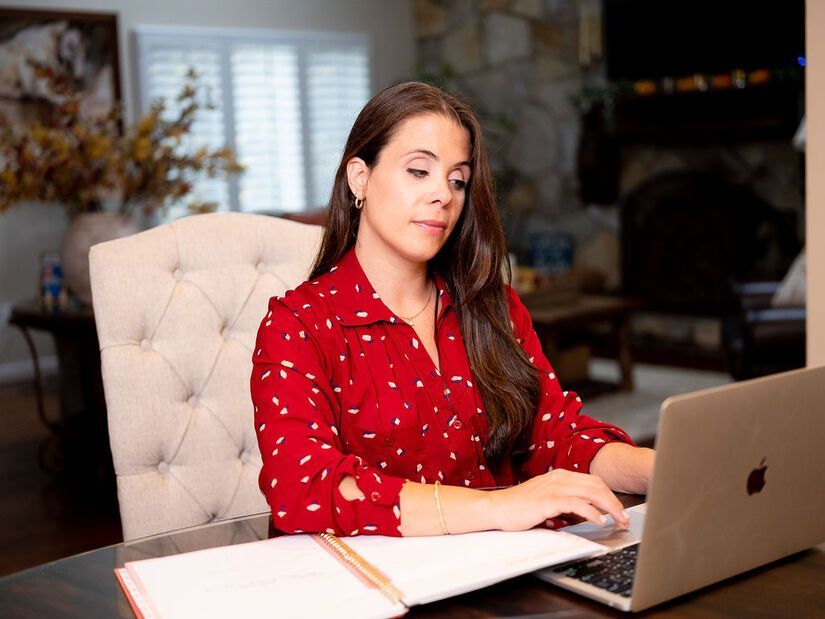Meet the woman who wants to help every senior citizen live their best life
Stephanie Roberti founded New Beginnings, Supportive Transitions for Seniors, in March after 15 years in the elder care industry. (Benjamin Allen / HudValley Photo)
Carol’s doctor was worried. At 94 years old, Carol was still living on her own, but her situation was becoming increasingly unsafe for her. He recommended she move into an assisted living facility, but Carol wouldn’t hear of it. So he called the only person he knew who could break through: Stephanie Roberti.
It took a couple visits for Roberti to build trust with Carol. “I said, I think this is going to be the right next step for you,” Roberti said, recalling one of her conversations with Carol. Over time, a bond formed between the two, and Carol agreed to move. Roberti didn’t stop there. She went to Carol’s home and packed up all her things, carrying the boxes down the stairs of Carol’s apartment building and into the moving van.
Today, Carol is thriving. She has a network of friends at her facility and she participates in the activities. She’s physically fit. “Those are the stories that I love,” Roberti said.

Photo by Benjamin Allen, HudValley Photo
Roberti runs New Beginnings, Supportive Transitions for Seniors, a business the Brewster resident formed in March to help clients navigate transitions for their loved ones. Roberti says she has been infatuated with seniors for as long as she can remember. As a teenager, she volunteered at the nursing home where her grandmother lived. For the past 15 years, she has worked in the elder care industry, and has a master’s degree in health care administration.
“As a senior advisor, I speak to a family and let them tell me what their needs are and what’s important to them.” Roberti helps find safe and comfortable living situations for clients, and also provides counsel on a range of issues related to senior care. She draws on her years of experience to educate and advise on everything from assisted living communities and insurance to interactions with doctors and lawyers.
To the uninitiated, the world of assisted living facilities can be completely overwhelming, both as far as understanding what is available and the sticker shock of how much they can cost. There are independent living apartments, enriched housing, assisted living, aging in place communities and nursing homes. Private pay communities can start at four thousand dollars a month for services and may cost as much as ten thousand dollars a month for individuals needing a memory care facility.
Roberti says that more and more assisted living buildings are popping up in Westchester and Connecticut to prepare for an aging Baby Boomer population. By 2030, 1 in 5 Americans are projected to be age 65 and older, according to U.S. Census Data. It’s a reality that Roberti says many of us are not prepared for.
“When your mom falls and she goes to the hospital, there’s no class to tell you what to do next,” Roberti said, noting that the resource typically offered to family members in such a situation is an overworked social worker who could be juggling dozens of clients at a time. What Roberti says she offers instead is extensive knowledge and loving support. “I want to treat every family that I work with like they’re my own family. I want them to say that Stephanie held my hand and that Stephanie cared.”
Roberti acknowledges that while the world of elder care is overwhelming, there are resources available. Several area towns offer day programs for seniors. North Salem has a senior group that meets on the second Tuesday of each month. Mahopac’s William Koehler Center is a hive of activity, offering lunch and transportation to and from the facility for its activities. Paratransit vans are available to take seniors to and from doctor’s visits and other errands for a small fee.
With New Beginnings, Roberti works to break things down for clients so that they feel like they have a hand to hold through it all. Clients complete a questionnaire before their initial consultation. From there, Roberti offers a range of services, including coordinating medical and social support; managing personal and medical documentation; assistance with securing financial resources; obtaining in-home care and advising on alternate housing options.
To get the word out about her business, Roberti has established a robust social media presence. On her
Instagram page, she posts fun and educational Reels that draw on her own experiences. Recent posts helped followers understand such topics as Medicare’s requirements for covering a stay in a skilled nursing facility and financial resources for New Yorkers searching for an assisted living facility. “I want to be that friendly face on social media,” Roberti said.

Stephanie Roberti at home in Brewster, NY. (Benjamin Allen / HudValley Photo)
On social media, Roberti’s target audience is the adult children of senior citizens, the ones who will most likely become the decisionmakers for their parents’ care. Occasionally Roberti’s own family members, including her 3-year-old daughter Valentina, make cameo appearances. Roberti hopes her posts provide education before situations suddenly become urgent. “People need to be open to the idea that their loved ones are aging,” she said. “There are things we can do on our end instead of waiting for that catastrophe.”
For those who are unsure whether it’s time to consider a new beginning for their loved one, Roberti says there are some signs to look out for. “Once you start seeing your loved one not taking care of themselves, or maybe their home isn’t as clean as it used to be, that’s a sign. If something doesn’t seem normal, there’s something not right,” Roberti said.
Despite the challenges of wading through the complex and often frustrating world that is senior care, Roberti insists that the personal connections she forms with seniors make her work feel less about work and more about forming deep, emotional bonds with people. “Just because you get old, it doesn’t mean that your feelings or desires go away,” she noted. “Seniors will tell me stories about how they dressed up and went to dance halls. They have lived such a long life; they have gone through so much. They deserve the best.”
Local resources for seniors:
AREAS I SERVE
Westchester County, Putnam County, Fairfield County Connecticut/, Litchfield County, New Haven County, Rockland County, Manhattan, Dutchess County, The Bronx, Bergan County, Posaick, Essex, Morris County, New York
HOURS
- Mon - Sun
- -
